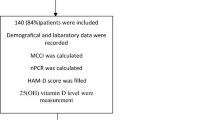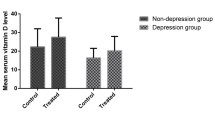Abstract
Purpose
This study was designed to investigate the effects of omega-3 fatty acids on depression and chronic inflammation in hemodialysis patients.
Method
Fifty-four maintenance hemodialysis patients were randomized to ingest two omega-3 (each containing 180 mg eicosapentaenoic acid and 120 mg docosahexaenoic acid) or placebo capsules, three times daily for 4 months. Main outcome measures: Beck Depression Inventory (BDI) score and serum levels of C-reactive protein (CRP), interleukin (IL)-6, IL-10, tumor necrosis factor (TNF)-α, ferritin, intact parathyroid hormone (iPTH), and ratios of IL-10 to IL-6 and IL-10 to TNF-α were measured at baseline and at the end of the study.
Results
Omega-3 supplement lowered BDI score significantly after 4 months of intervention. Among pro- and anti-inflammatory mediators, only serum ferritin level and IL-10 to IL-6 ratio showed significant changes in favor of omega-3 supplement during the study. In linear regression model adjusted for baseline values, omega-3 treatment was a significant predictor of reduced serum CRP, ferritin, and iPTH levels, and increased IL-10 to IL-6 ratio. No significant association was found between the anti-inflammatory and anti-depressant effects of omega-3 supplement.
Conclusions
Supplemental use of omega-3 fatty acids decreases depressive symptoms in hemodialysis patients apart from their anti-inflammatory effects.

Similar content being viewed by others
References
Noori N, Dukkipati R, Kovesdy CP, Sim JJ, Feroze U, Murali SB, Bross R, Benner D, Kopple JD, Kalantar-Zadeh K (2011) Dietary omega-3 fatty acid, ratio of omega-6 to omega-3 intake, inflammation, and survival in long-term hemodialysis patients. Am J Kidney Dis 58:248–256. doi:10.1053/j.ajkd.2011.03.017
Taraz M, Khatami MR, Gharekhani A, Abdollahi A, Khalili H, Dashti-Khavidaki S (2012) Relationship between a pro- and anti-inflammatory cytokine imbalance and depression in hemodialysis patients. Eur Cytokine Netw 23:179–186. doi:10.1684/ecn.2013.0326
Chilcot J, Wellsted D, Farrington K (2010) Depression in end-stage renal disease: Current advances and research. Semin Dial 23:74–82. doi:10.1111/J.1525-139x.2009.0D628.x
Atalay H, Solak Y, Biyik M, Biyik Z, Yeksan M, Uguz F, Guney I, Tonbul HZ, Turk S (2010) Sertraline treatment is associated with an improvement in depression and health-related quality of life in chronic peritoneal dialysis patients. Int Urol Nephrol 42:527–536. doi:10.1007/s11255-0D9-9686-y
Tossani E, Cassano P, Fava M (2005) Depression and renal disease. Semin Dial 18:73–81
Kalender B, Ozdemir AC, Koroglu G (2006) Association of depression with markers of nutrition and inflammation in chronic kidney disease and end-stage renal disease. Nephron Clin Pract 102:c115–c121
Kimmel PL, Cukor D, Cohen SD, Peterson RA (2007) Depression in end-stage renal disease patients: A critical review. Adv Chronic Kidney Dis 14:328–334
Simic Ogrizovic S, Jovanovic D, Dopsaj V, Radovic M, Sumarac Z, Bogavac SN, Stosovic M, Stanojevic M, Nesic V (2009) Could depression be a new branch of MIA syndrome? Clin Nephrol 71:164–172
Sutcigil L, Oktenli C, Musabak U, Bozkurt A, Consever A, Uzun O, Sanisoglu Y, Yesilova Z, Ozmeneler N, Ozsahin A, Sengul A (2007) Pro- and anti-inflammatory cytokine balance in major depression: Effect of sertraline therapy. Clin Dev Immunol 76396:1–6. doi:10.1155/2007/76396
Perunicic-Pekovic GB, Rasic ZR, Pljesa SI, Sobajic SS, Djuricic I, Maletic R, Ristic-Medic DK (2007) Effect of n-3 fatty acids on nutritional status and inflammatory markers in hemodialysis patients. Nephrology (Carlton) 12:331–336
Tajalizadekhoob Y, Sharifi F, Fakhrzadeh H, Mirarefin M, Ghaderpanahi M, Badamchizade Z, Azimipour S (2011) The effect of low-dose omega 3 fatty acids on the treatment of mild to moderate depression in the elderly: a double-blind, randomized, placebo-controlled study. Eur Arch Psychiatry Clin Neurosci 261:539–549. doi:10.1007/S00408-D11-0191-9
Dinan T, Siggins L, Scully P, O'Brien S, Ross P, Stanton C (2009) Investigating the inflammatory phenotype of major depression: Focus on cytokines and polyunsaturated fatty acids. J Psychiatr Res 43:471–476. doi:10.1016/j.jpsychires.2008.06.003
Watnick S, Wang PL, Demadura T, Ganzini L (2005) Validation of 2 depression screening tools in dialysis patients. Am J Kidney Dis 46:919–924
Hedayati SS, Bosworth HB, Kuchibhatla M, Kimmel PL, Szczech LA (2006) The predictive value of self-report scales compared with physician diagnosis of depression in hemodialysis patients. Kidney Int 69:1662–1668
Craven JL, Rodin JM, Littlefield C (1988) The beck depression inventory as a screening device for major depression in renal dialysis patients. Int J Psychiatry Med 18:365–374
Ghassemzadeh H, Mojtabai R, Karamghadiri N, Ebrahimkhani N (2005) Psychometric properties of a Persian-language version of the Beck Depression Inventory-second edition: BDI-II-Persian. Depress Anxiety 21:185–192
Finkelstein FO, Finkelstein SH (2000) Depression in chronic dialysis patients: assessment and treatment. Nephrol Dial Transplant 15:1911–1913
Hibbeln JR, Salem N (1995) Dietary polyunsaturated fatty acids and depression: when cholesterol does not satisfy. Am J Clin Nutr 62:1–9
Jadoon A, Chiu CC, McDermott L, Cunningham P, Frangou S, Chang CJ, Sun IW, Liu SI, Lu ML, Su KP, Huang SY, Stewart R (2012) Associations of polyunsaturated fatty acids with residual depression or anxiety in older people with major depression. J Affect Disord 136:918–925. doi:10.1016/j/jad.2011.09.007
Grenyer BFS, Crowe T, Meyer B, Owen AJ, Grigonis-Deane EM, Caputi P, Howe PR (2007) Fish oil supplementation in the treatment of major depression: A randomized double-blind placebo-controlled trial. Prog Neuropsychopharmacol Biol Psychiatry 31:1393–1396
Chalon S (2006) Omega-3 fatty acids and monoamine neurotransmission. Prostaglandins Leukot Essent Fat Acids 75:259–269
Farooqui AA, Ong WY, Horrocks LA (2006) Inhibitors of brain phospholipase A2 activity: Their neuropharmacological effects and therapeutic importance for the treatment of neurologic disorders. Pharmacol Rev 58:591–620
Pottala JV, Talley JA, Churchill SW, Lynch DA, von Schacky C, Harris WS (2012) Red blood cell fatty acids are associated with depression in a case-control study of adolescents. Prostaglandins Leukot Essent Fat Acids 86:161–165. doi:10.1016/j.plefa.2012.03.002
Adams PB, Lawson S, Sanigorski A, Sinclair AJ (1996) Arachidonic acid to eicosapentaenoic acid ratio in blood correlates positively with clinical symptoms of depression. Lipids Suppl 31:S157–S161
Conklin SM, Manuck SB, Yao JK, Flory JD, Hibbeln JR, Muldoon MF (2007) High ω-6 and low ω-3 fatty acids are associated with depressive symptoms and neuroticism. Psychosom Med 69:932–934
Szklarek-Kubicka M, Fijałkowska-Morawska J, Zaremba-Drobnik D, Uciński A, Czekalski S, Nowicki M (2009) Effect of intradialytic intravenous administration of ω-3 fatty acids on nutritional status and inflammatory response in hemodialysis patients: A pilot study. J Ren Nutr 19:487–493. doi:10.1053/j.jrn.2009.05.007
Saifullah A, Watkins BA, Saha C, Li Y, Moe SM, Friedman AN (2007) Oral fish oil supplementation raises blood omega-3 levels and lowers C-reactive protein in haemodialysis patients-a pilot study. Nephrol Dial Transplant 22:3561–3567
Sinn N, Milte CM, Street SJ, Buckley JD, Coates AM, Petkov J, Howe PR (2012) Effects of n-3 fatty acids, EPA v. DHA, on depressive symptoms, quality of life, memory and executive function in older adults with mild cognitive impairment: a 6-month randomized controlled trial. Br J Nutr 107:1682–1693. doi:10.1017/s0007114511004788
Rizzo AM, Corsetto PA, Montorfano G, Opizzi A, Faliva M, Giacosa A, Ricevuti G, Pelucchi C, Berra B, Rondanelli M (2012) Comparison between the AA/EPA ratio in depressed and non depressed elderly females: omega-3 fatty acid supplementation correlates with improved symptoms but does not change immunological parameters. Nutr J 82:1–11. doi:10.1186/1475-2891-11-82
Mischoulon D, Papakostas GI, Dording CM, Farabaugh AH, Sonawalla SB, Agoston AM, Smith J, Beaumont EC, Dahan LE, Alpert JE, Nierenberg AA, Fava M (2009) A double-blind randomized controlled trial of ethyl-eicosapentaenoate (EPA-E) for major depressive disorder. J Clin Psychiatry 70:1636–1644. doi:10.4088/JCP.08m04603
Kraguljac NV, Montori VM, Pavuluri M, Chai HS, Wilson BS, Unal SS (2009) Efficacy of omega-3 fatty acids in mood disorders – a systematic review and metaanalysis. Psychopharmacol Bull 42:39–54
Martins JG (2009) EPA but not DHA appears to be responsible for the efficacy of omega-3 long chain polyunsaturated fatty acid supplementation in depression: evidence from a meta-analysis of randomized controlled trials. J Am Coll Nutr 28:525–542
Appleton KM, Rogers PJ, Ness AR (2010) Updated systematic review and meta-analysis of the effects of n-3 long-chain polyunsaturated fatty acids on depressed mood. Am J Clin Nutr 91:757–770. doi:10.3945/ajcn.2009.28313
Bloch MH, Hannestad J (2012) Omega-3 fatty acids for the treatment of depression: Systematic review and meta-analysis. Mol Psychiatry 17:1272–1282. doi:10.1038/mp.2011.100
Sublette ME, Ellis SP, Geant AL, Mann JJ (2011) Meta-analysis: Effects of eicosapentaenoic acid in clinical trials in depression. J Clin Psychiatry 72:1577–1584. doi:10.4088/JCP.10m06634
Martins JG, Bentsen H, Puri BK (2012) Eicosapentaenoic acid appears to be the key omega-3 fatty acid component associated with efficacy in major depressive disorder: a critique of Bloch and Hannestad and updated meta-analysis. Mol Psychiatry 17:1144–1149. doi:10.1038/mp.2012.25
Jazayeri S, Tehrani-Doost M, Keshavarz SA, Hosseini M, Djazayeri A, Amini H, Jalali M, Peet M (2008) Comparison of therapeutic effects of omega-3 fatty acid eicosapentaenoic acid and fluoxetine, separately and in combination, in major depressive disorder. Aust N Z J Psychiatry 42:192–198. doi:10.1080/00048670701827275
Gertsik L, Poland RE, Bresee C, Rapaport MH (2012) Omega-3 fatty acid augmentation of citalopram treatment for patients with major depressive disorder. J Clin Psychopharmacol 32:61–64. doi:10.1097/JCP.0b013e31823f3b5f
Basterzi AD, Aydemir C, Kisa C, Aksaray S, Tuzer V, Yazici K, Göka E (2005) IL-6 levels decrease with SSRI treatment in patients with major depression. Hum Psychopharmacol 20:473–476
Kubera M, Lin AH, Kenis G, Bosmans E, van Bockstaele D, Maes M (2001) Anti-inflammatory effects of antidepressants through suppression of the interferon-γ/interleukin-10 production ratio. J Clin Psychopharmacol 21:199–206
Rasic-Milutinovic Z, Perunicic G, Pljesa S, Gluvic Z, Sobajic S, Djuric I, Ristic D (2007) Effects of N-3 PUFAs supplementation on insulin resistance and inflammatory biomarkers in hemodialysis patients. Ren Fail 29:321–329
Himmelfarb J, Phinney S, Ikizler TA, Kane J, McMonagle E, Miller G (2007) Gamma-tocopherol and docosahexaenoic acid decrease inflammation in dialysis patients. J Ren Nutr 17:296–304
Janssen DGA, Caniato RN, Verster JC, Baune BT (2010) A psychoneuroimmunological review on cytokines involved in antidepressant treatment response. Hum Psychopharmacol 25:201–215. doi:10.1002/hup.1103
Hegarty B, Parker G (2013) Fish oil as a management component for mood disorders – an evolving signal. Curr Opin Psychiatry 26:33–40. doi:10.1097/YCO.0b013e32835ab4a7
Bowden RG, Wilson RL, Deike E, Gentile M (2009) Fish oil supplementation lowers C-reactive protein levels independent of triglyceride reduction in patients with end-stage renal disease. Nutr Clin Pract 24:508–512. doi:10.1177/0884533609335376
Yeun JY, Levine RA, Mantadilok V, Kaysen GA (2000) C-reactive protein predicts all-cause and cardiovascular mortality in hemodialysis patients. Am J Kidney Dis 35:469–476
Montinaro V, Laffaldano GP, Granata S, Porcelli P, Todarello O, Schena FP, Pertosa G (2010) Emotional symptoms, quality of life and cytokine profile in hemodialysis patients. Clin Nephrol 73:36–43
Dervisoglu E, Kir HM, Kalender B, Eraldemir C, Caglayan C (2008) Depressive symptoms and proinflammatory cytokine levels in chronic renal failure patients. Nephron Clin Pract 108:c272–c277. doi:10.1159/000126907
Kalender B, Dervisoglu E, Sengul E, Ozdemir AC, Akhan SC, Yalug I, Uzun H (2007) Depression, nutritional status, and serum cytokines is peritoneal dialysis patients: Is there a relationship? Perit Dial Int 27:593–595
Knuth B, Radtke V, Rocha P, da Silva KS, Dalsóglio F, Gazal M, Jansen K, Souza DO, Portela LV, Kaster M, Oses JP (2013) Prevalence of depression symptoms and serum levels of interleukin-6 in hemodialysis patients. Psychiatry Clin Neurosci. doi:10.1111/pcn.12130
Friedman A, Moe S (2006) Review of the effects of omega-3 supplementation in dialysis patients. Clin J Am Soc Nephrol 1:182–192
Madsen T, Christensen JH, Svensson M, Witt PM, Toft E, Schmidt EB (2011) Marine n-3 polyunsaturated fatty acids in patients with end-stage renal failure and in subjects without kidney disease: a comparative study. J Ren Nutr 21:169–175. doi:10.1053/j.jrn.2010.06.020
Acknowledgement
The authors thank Zahravi Pharmaceutical Co., Tehran, Iran for providing placebo free of charge and Dr. Amir Hekmat for kindly coordinating the researchers’ team and the pharmaceutical company. The authors also appreciate the valuable help of the hemodialysis nursing teams of Imam-Khomeini Hospital Complex and Sina Hospital, especially Mrs. Abdpoor.
Conflict of interest
The authors declare no conflict of interest.
Ethical conduct of research
The present study was supported by Tehran University of Medical Sciences (grant No: 17020). All participants signed written, informed consent forms. The study protocol was approved by the local ethics committee of Tehran University of Medical Sciences and registered in Iranian Registry of Clinical Trials (registry number: IRCT201202203043N5).
Author information
Authors and Affiliations
Corresponding author
Rights and permissions
About this article
Cite this article
Gharekhani, A., Khatami, MR., Dashti-Khavidaki, S. et al. The effect of omega-3 fatty acids on depressive symptoms and inflammatory markers in maintenance hemodialysis patients: a randomized, placebo-controlled clinical trial. Eur J Clin Pharmacol 70, 655–665 (2014). https://doi.org/10.1007/s00228-014-1666-1
Received:
Accepted:
Published:
Issue Date:
DOI: https://doi.org/10.1007/s00228-014-1666-1




